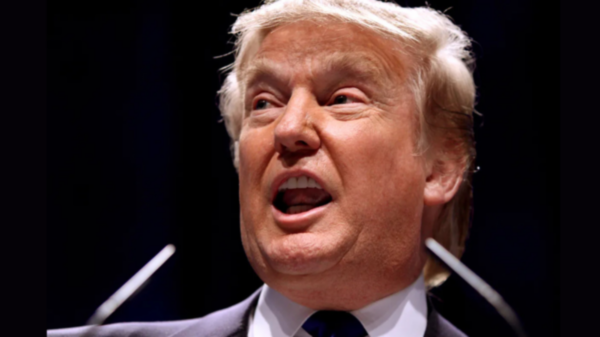By Joseph Ferguson and Thomas A. Durkin

After three indictments of former President Donald Trump, the fourth one in Georgia came not as a surprise but as a powerful exposition of the scope of Trump’s efforts to remain in power despite losing the 2020 presidential election.
New conservative legal scholarship spells out how and why those actions – which were observed by the public over many months – disqualify Trump from serving in the presidency ever again. And our read of the Georgia indictment, as longtime lawyers ourselves, shows why and how that disqualification can be put into effect.
The key to all of this is the 14th Amendment to the Constitution, which states that “No person shall … hold any office, under the United States … who, having previously taken an oath … to support the Constitution of the United States, shall have engaged in insurrection or rebellion against the same, or given aid or comfort to the enemies thereof.” Trump took that oath at his inauguration on Jan. 20, 2017.
Both Trump’s Georgia indictment, and his federal indictment in Washington, D.C., cite largely public information – and some newly unearthed material – to spell out exactly how he engaged in efforts to rebel against the Constitution, and sought and gave aid and comfort to others who also did so.
Legal scholars William Baude and Michael Stokes Paulsen, conservatives themselves and members of the conservative Federalist Society, have recently published a paper declaring that under the 14th Amendment, Trump’s actions render him ineligible to hold office.
We believe the Georgia indictment provides even more detail than the earlier federal one about how Trump’s actions have already disqualified him from office, and shows a way to keep him off the ballot in 2024.

Disqualification is automatic
Trump’s supporters might argue that disqualifying him would be unfair without a trial and conviction on the Jan. 6 indictment, and perhaps the Georgia charges.
But Baude and Paulsen, using originalist interpretation – the interpretive theory of choice of the powerful Federalist Society and Trump’s conservative court appointees, which gives full meaning to the actual, original text of the Constitution – demonstrate that no legal proceeding is required. They say disqualification is automatic, or what’s known in the legal world as “self-executing.”
Recent public comments from liberal constitutional scholar Laurence Tribe and conservative jurist and former federal judge Michael Luttig – who has characterized the events before, during and since Jan. 6 as Trump’s “declared war on American democracy” – suggest an emerging bipartisan consensus supporting Baude and Paulsen.
Backed by history
This is not a theoretical bit of technical law. This provision of the 14th Amendment was, in fact, extensively used after the Civil War to keep former Confederate leaders from serving in the federal government, without being tried or convicted of any crime.
Few former Confederates were charged with crimes associated with secession, rebellion and open war against the United States. And most were pardoned by sweeping orders issued by President Andrew Johnson.
But even though they had no relevant convictions, former Confederates were in fact barred from office in the U.S.
In December 1865, several who had neither been convicted nor been pardoned tried to claim seats in the U.S. House of Representatives. But the House clerk refused to swear them in. It took an act of Congress – the 1872 Amnesty Act – to later restore their office-holding rights.
There is no requirement in the Constitution that the disqualification be imposed by any specific process – only that it applies to people who take certain actions against the Constitution.
A path through the states
For the U.S. in 2023, we believe the most realistic avenue to enforce the 14th Amendment’s ban on a second Trump presidency is through state election authorities. That’s where the Georgia indictment comes in.
State election officials could themselves, or in response to a petition of a citizen of that state, refuse Trump a place on the 2024 ballot because of the automatic 14th Amendment disqualification.
Trump would certainly challenge the move in federal court. But the recent disqualification proceedings against former North Carolina Congressman Madison Cawthorn provides a road map and binding legal precedent affirming the 14th Amendment as a valid legal ground for disqualification of a candidate for federal office.
The Georgia indictment against Trump and allies exhaustively details extensive acts of lying, manipulation and threats against Georgia officials, as well as a fraudulent fake elector scheme to illegally subvert the legitimate 2020 Georgia presidential vote tally and resulting elector certification.
Trump’s failure to accomplish what is tantamount to a coup in Georgia and other swing states set the stage for the violent insurrection of Jan. 6, 2021, that sought to achieve the same result – Trump’s fraudulent installation to a second term.
In fact, the Georgia scheme is included in Special Counsel Jack Smith’s federal indictment as one of the methods and means in “aid” of the larger Jan. 6 federal conspiracy against the United States.
Baude and Paulsen acknowledge that “insurrection and rebellion” are traditionally associated with forced or violent opposition. But we see the broader set of actions by Trump and his allies to subvert the Constitution – the Georgia vote count and fake elector scheme included – as part of a political coup d’etat. It was a rebellion.
Georgia as a bellwether
So what makes the Georgia scheme and indictment compelling for purposes of disqualifying Trump from the 2024 Georgia ballot?
There are minimally six aspects revealed in the latest indictment that we believe justify Georgia – under Section 3 of the post-Civil War Fourteenth Amendment – keeping Trump off the ballot:
- The racketeering scheme was a multifaceted attempt to subvert Georgia’s own part of the 2020 electoral process;
- The officials on the receiving end of the unsuccessful racketeering scheme were elected and appointed Georgia officials. …
- … whose actions to reject election subversion vindicated their own oaths to uphold the Constitution and laws of the United States as well as Georgia’s;
- Most of these officials were and are Republicans – including Secretary of State Brad Raffensberger, Governor Brian Kemp and former Lt. Governor Geoff Duncan;
- These officials will, in 2024 as in 2020, collectively determine who is qualified to be on Georgia’s presidential ballot; and
- These officials’ testimony, and related evidence, is at the heart of the proof of the Georgia racketeering case against Trump.
In other words, the evidence to convict Trump in the Georgia racketeering case is the same evidence, coming from the same Georgia officials, who will be involved in determining whether, under the 14th Amendment, Trump is qualified to be on the 2024 presidential ballot – or not.
Little if any additional evidence or proceedings are needed. The Georgia officials already hold that evidence, because much of it comes from them. They don’t need a trial to establish what they already know.
How could Trump avoid this happening? A quick trial date in Atlanta with an acquittal on all counts might do it, but this runs counter to his strategy to delay all the pending criminal cases until after the 2024 election.
With no preelection trial, there will likely be no Trump on the 2024 Georgia ballot, and no chance for him to win Georgia’s 2024 electoral college votes.
Once Georgia bars him, other states may follow. That would leave Trump with no way to credibly appear on the ballot in all 50 states, giving him no chance to win the electoral votes required to claim the White House.
Joseph Ferguson, Co-Director, National Security and Civil Rights Program, Loyola University Chicago and Thomas A. Durkin, Distinguished Practitioner in Residence, Loyola University Chicago
This article is republished from The Conversation under a Creative Commons license. Read the original article.







You must be logged in to post a comment Login